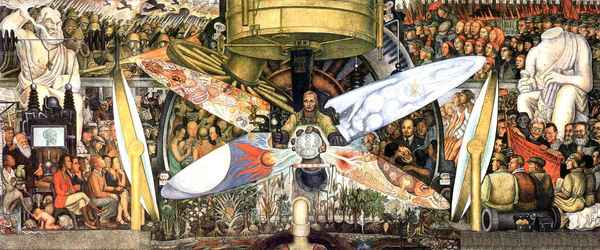Dogfooding the rules-based international order
This post is migrated from the old Wordpress blog. Some things may be broken.
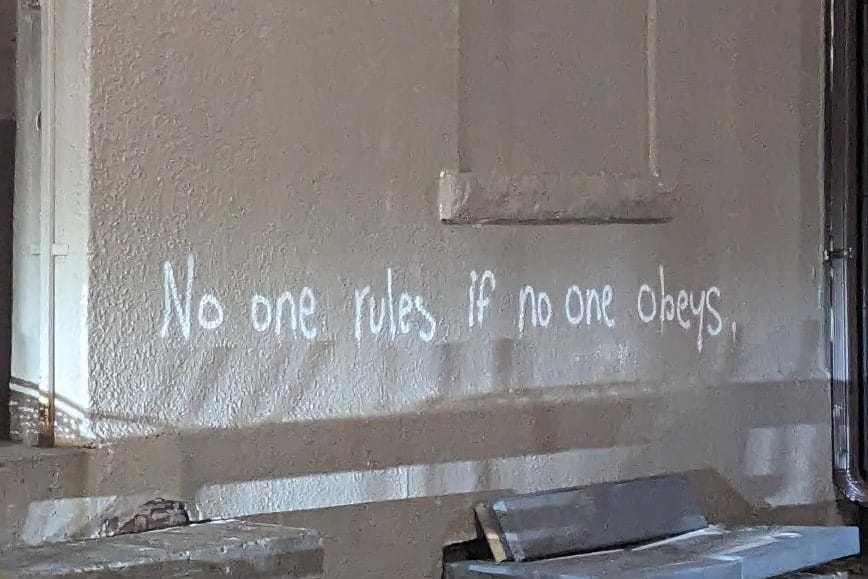
Tl;dr: A long, rambling and not very “tech” related post this week, looking at the recent ICJ ruling about evidence of acts of genocide in Gaza, defending a rules-based international order in a world that sometimes feels like it’s quiet quitting that notion, and how we learn from history.
Update: This post in Foreign Affairs, published 14th of feb, addresses the same topic in less time (if organised writing with fewer mistakes is your kind of thing) but I’m just going to note that I was there first. — Yours truly (15/02/2024)
Second update: In which UN Secretary-General Antonio Guterres also agrees with this post, stating that Israel’s war on Gaza shows how divided world geopolitics is with a global order that’s “not working for anyone”. (16/02/2024)
A Mastodon account dedicated to sharing radical/anarchist kinds of images of graffiti posted the above image a few days ago. Before we get too far, this isn’t a criticism of that account. I’m not sharing a link or even a screenshot to avoid contributing to a pile-on. As of this typing, 242 people have re-shared it and 105 people have ‘liked’ it, which is also fine. This isn’t a dig at whether people should be able to post, share or like whatever they want, either. So, what is it?
It’s many things. But first, it’s about the words themselves. Whenever you see a political slogan as succinct as a Hallmark greeting card, some thought has gone into it. This one has all the signs of a good ol’e anti-authoritarian, fuck-the-man, ‘don’t be a bootlicker’, etc. message that a lot of people could get behind from across a fairly wide-cross section of perspectives. Good stuff. But if I were a location scout for some post-apocalyptic HBO series, I would definitely add this place to my locations database for a scene needing an ironic backdrop. It reminded me of the apocryphal saying, “may you live interesting times.” It could more easily be a curse than a blessing. (Note: Either way, there’s zero evidence that the line was a Chinese expression at all, so it’s probably not, making it all the more suitable for this reference.) I decided the graffiti person didn’t come up with this one, so off we popped to Google’s image search.
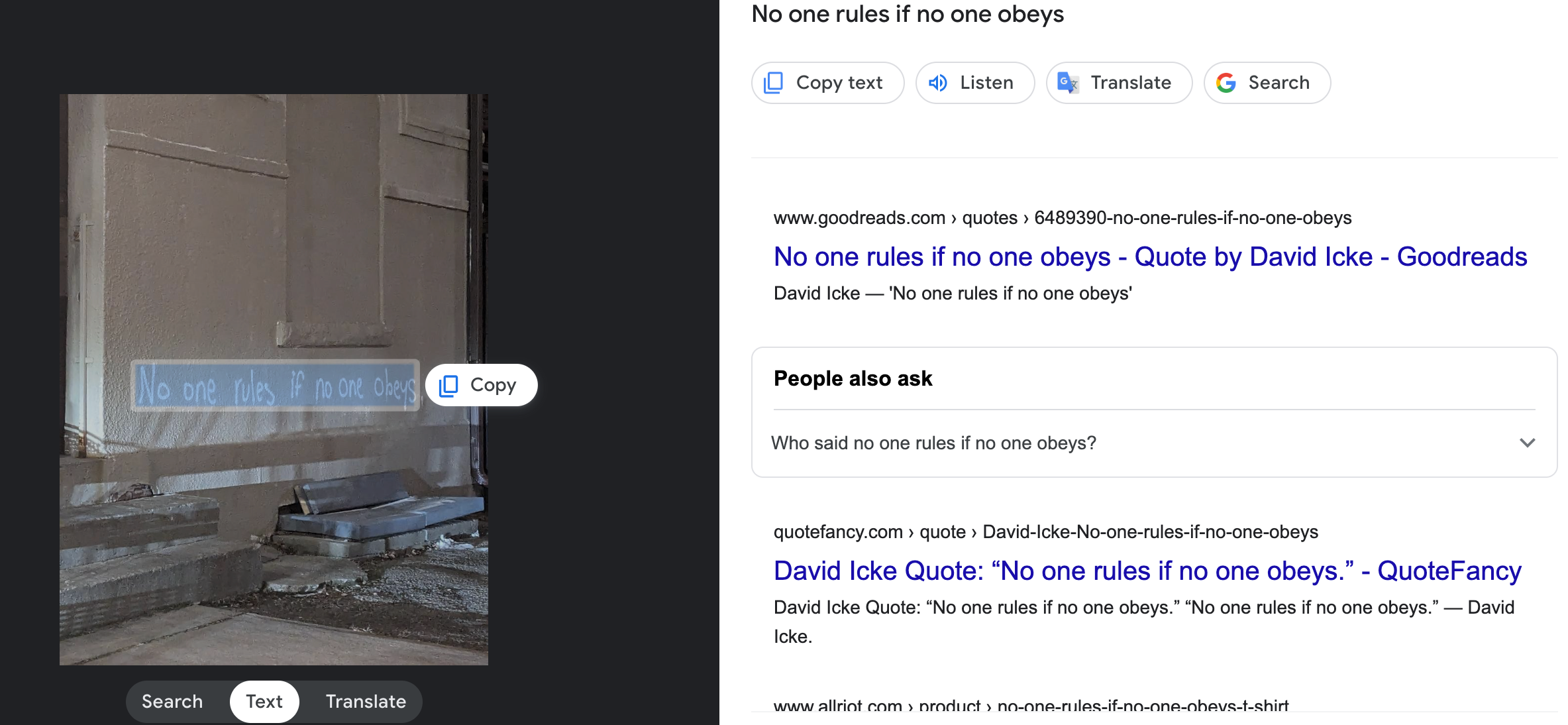
So… the catchy phrase has been broadly attributed to noted anti-Semitic conspiracy nutter David Icke (the ‘lizard people‘ guy). Once you search it, you’ll find it’s made its way onto eBay, a couple quote sites, on Reddit, and elsewhere. Sometimes it is attributed to Icke. Other times it is not attributed at all. However, I haven’t (in my unscientific research, aka “googling”) seen an example of where it’s attributed to anyone else.
It’s a sly little line. It sounds like something Hannah Arendt could have said. In fact, she said something fairly similar: “No one has the right to obey.” In her case, we understand the context and origin and reference point to totalitarian regimes and the obligation to confront fascism (Nazis, in particular). The Icke-attributed phrase is murkier. We can only associate it with Icke himself and what he tends to represent. This makes for stunning propaganda as SEO. See it in the wild; search it up; there’s our New World Order conspiracy guy. I doubt the whomever daubed it on a wall knew the origin of it themselves, but they’re a part of it.
The account posting it likely did from a good faith point of view: People have often needed to oppose or actively defy laws. Slavery, segregation, apartheid, inequality, anti-abortion efforts, censorship, illegal wars, various kinds of anti-democratic or totalitarian regimes, coups, regulation that is just oppressive in nature, etc. These things should be opposed, and have been, violently when other means weren’t available. No one can seriously argue against that. Or they can, but they’re wrong.
But vague aphorisms survive because they are like Swiss Army Knives, with a function for nearly any situation. Often the right wing will employ similar phrases to oppose things like LGBTQ-rights legislation, or try to storm the Capitol building in Wash. D.C. No one actually said “be the change you want to see in the world,” but it has been attributed to Mahatma Gandhi. How would the context change if it had been attributed to, say, Pol Pot?

“Why do we compare? We compare to learn. This is how we understand the world. A colour is a colour only among other colours. A shape is a shape only as it is distinct from other shapes. A feeling is a feeling only if you have experienced other feelings.”
Masha Gessen
Without context, comparison and source, things are fairly meaningless. Our legal frameworks, scientific progress, philosophical understandings are built upon citations. We stand on the shoulders of giants, or we dance upon their graves, but either way we generally know why we’re there doing the thing.
There is this phrase I have occasionally deployed at key moments in personal or professional relations: “I light the way by the bridges I burn.” It hits that sweet spot of uplifting pyromania. I’d once seen it posted on Twitter (I think it was) by someone I tended to admire for their gift at caustic mic-drop statements. I thought they’d actually coined it. So it was a funny and serendipitous surprise when during a typical morning doom-scroll session that I happened to learn that it was first uttered by Beverly Hills 90210 character Dylan McKay. Say what you will about The Bev scriptwriters, they were no lightweights. The context shifted, though. The edge was slightly dulled (no offence to the acting chops of Luke Perry intended).
We all know how weaponised memes work, there’s a whole book on it. Misattribution and misappropriation are effective mechanisms to give a situation some different, or more favourable context or justification. I wanted a term for specifically for when a quote escapes from (or is let loose by) its source, lives its best life, and yet acts as a breadcrumb trail back. So, I turned to the ultimate dodgy source, ChatGPT, and asked it to give me some options. It offered a few…
- EchoQuotient:
Combining “echo” to represent the echoing or repetition of the quote and “quotient” to signify a measurable aspect, suggesting the degree of detachment or association with the original source. - ContextDrift:
Reflecting the idea that the original context of the quote has drifted or shifted as it circulates in different circles, potentially leading to unintended associations. - SourceShadowing:
Highlighting the concept that the original source casts a shadow over the saying, influencing perceptions and connections, even if indirectly. - TrailCredence:
Merging “trail” to represent the breadcrumb trail and “credence” to signify the unintended credibility or legitimacy conferred to the original source through the usage of the quote. - AttribuTrickle:
Combining “attribute” and “trickle” to suggest the gradual attribution of the saying to its source, sometimes in a subtle or indirect manner.”
Perhaps “ContextDrift” gets closest. When we lose the historical plot, it’s easy to re-cast what we experience in the present any way we see fit. When parts of the past are closed off, declared null and void, or invent alternative justifications. Omitting or black-listing history and divorcing the present from relevant context can be powerful weapons to get up to all sorts. You can more easily weaken laws, justify tyranny, target a minority group, hide from past wrongs instead of making reparations or addressing inequality. You can do war crimes. You can commit genocide and say it’s something else.
The knee-jerk reaction to our increasingly frustrating and complex (and fragile) systems is our occasional zeal to burn it all down. I get it. Apocalyptic genre films and TV shows are satisfying for this and provide some catharsis. My current favourite show of this genre is Station Eleven, which bucks the typical Malthusian fetish and postulates that it will be the arts & humanities majors who will rule the surviving communities amid the wreckage. But that’s the fantasy. I wouldn’t want to live in an actual one. The reality is actually pretty brutal and there are real-world examples of it. There are far too many people fretting over the conspiracy theories about a conceptual “deep state” model and not enough people thinking about how to mitigate the myriad very real eventualities in which the dangerously shallow ones emerge that some of us are fortunate enough to see on the news instead of waking up in them.
Suffice to say, we should be wary of the people (or parties or governments) who want to toss everything — often times legal protections included, as flawed as they can sometimes be — into the dust bin. Because they’ll want to replace it somehow with a new set of rules. If they could, what would Icke and those like him replace them with? That’s a loaded question, of course. It’s loaded because we know history.

I’d been mulling that picture of the graffiti (photographer unknown) for more time than I’m prepared to admit since first scrolling by it. Not just as an isolated phrase, but in the context of a few relatively recent and current events. Most notably among them is the ruling by the International Court of Justice (ICJ) that Israel’s government must desist from acts that constitute genocide in its assault on Gaza. We can’t talk about this unless we can talk about the Genocide Convention, and at its origins is the Holocaust. In fact, much of what we have in terms of a rules-based international order in one way or another stems from that central tragedy of the 20th century. It’s hard to avoid.
There is a strong taboo around comparisons to the Holocaust or the Nazi’s persecution of Jews. In UK, the Labour party may give you the boot for it, citing in its anti-Semitism policy that “Labour members should resist the use of Hitler, Nazi and Holocaust metaphors, distortions and comparisons in debates about Israel-Palestine in particular.”
There are of course absurd or weaponised uses of Holocaust comparison. This has been prevalent on the internet nearly since its origins, inspiring attorney and author Mike Godwin to assert in 1990: “As an online discussion grows longer, the probability of a comparison involving Nazis or Hitler approaches.” Godwin’s Law was aimed at trying to reduce the ubiquity of often dodgy comparisons that trivialised the Holocaust, were obviously hyperbolic, or often poor taste. It worked very well. A kind of reduced version of it was “everyone I don’t like is Hitler.”
Then Trump came along and actual fascists were marching in support of him in places like Charlottesville, Va. Someone posted the following message on Godwin’s Facebook page: “Your adage is invoked so very often to shut down discussions about politics and social issues as soon as any comparisons to Nazism and 1930s Germany are made, but now that videos have surfaced showing the Nazi flag being waved in the Charlottesville parade. … Sir, would you please make a public statement?” Godwin did: “By all means, compare these shitheads to Nazis. Again and again. I’m with you.” People could start saying it’s okay to punch Nazis on the internet again.
Yet, with regards to ICJ genocide allegations against Israel in Gaza, there is still an effort to enforce the taboo. All this would seem to be far away and not entirely relevant in Bellingham, Wash. a city nestled high up in my beloved Northwest (viva Cascadia!). But that’s not how the world or hippy activism works. There was recently a city council meeting in which a resolution was up for debate, asking the council to lend vocal support to a ceasefire in Gaza. Performative? Maybe. A revised draft passed. A woman speaking in opposition made a Freudian slip not lost on the resolution’s supporters: One act of genocides can be comparable to another act of genocide.
“Comparison is the way we know the world. And yet we make rules about things that cannot be compared to each other.” said Masha Gessen, upon receiving the Hannah Arendt Prize for Political Thought. Gessen, a Russian-American journalist and writer, continued: “… And yet there is a rule — and it is certainly not unique to Germany — that you don’t compare things to the Holocaust. There is a paradox: we imagine the Holocaust in great detail, but we conceive of it as fundamentally unimaginable. It is the kind of evil that we cannot comprehend. But anything that happens in the present is, by definition, imaginable. We can see it. Even small children separated from their parents at the US border and placed in detention are imaginable once we see pictures of them on our screens and hear their voices in audio recordings. So, when Representative Alexandria Ocasio-Cortez in 2019 used the words ‘concentration camps’ to describe migrant detention facilities, this comparison drew fire, among other reasons, because it placed the imaginable—a regular practice of the US government—next to the unimaginable. Anything that is imaginable by the very fact of being seen, heard, witnessed, strikes us as being incomparable to the Holocaust.”
It was good to come across Gessen’s remarks today. I’d been thinking of a similar point of view expressed by the historian and author Timothy Snyder, though originally more in light of that damned line: “no one rules if no one obeys.” Here as well, Snyder makes the case that we can’t make parts of history off limits if it’s to be understood or learned from.
“The idea that freedom is the absence of the state is the error that you can afford when you have a functional state. It’s a luxury view.”
Timothy Snyder
This interview in 2016 with Snyder takes place the year after Snyder’s book, “Black Earth: The Holocaust as History and Warning,” was published. The discussion is about what can be gleaned from fascist period in Europe and the Holocaust and applied to our current times, particularly with what was happening in 2016.
“If we actually believe [the Holocaust] is the central event of the 20th century” said Snyder, “and it’s not just something that we say to put it behind plexiglass or mount them on the wall … the things that are really important we don’t put behind plexiglass or mount them on the wall, we don’t turn them into plaques. The things that are really important we learn from. And if we learn from them, the things that look unfamiliar start to look a little more familiar and more comprehensible.” (It’s better in audio, it transcribes horribly.)
The interview and his book cover a lot of terrain. But his focus here was on understanding how the NSDAP (read: Nazis) re-engineered and dismantled large parts of the legal system and the state itself. The Nuremberg Laws deprived Jews of citizenship and associated rights, rendering them vulnerable — in an extra-legal status — to persecution culminating in a genocide of more than 6 million.
There is a line people in civil disobedience circles penned by Martin Luther King Jr. during his time in Birmingham City Jail: “We can never forget that everything Hitler did in Germany was ‘legal’ and everything the Hungarian freedom fighters did in Hungary was ‘illegal.'” In a general way it’s true, however, to me it also glosses over what sets the fascist era in Europe — particularly the Nazi regime’s attempt to annihilate Jews — apart. is the defining period of the 20th century. King’s line, while a useful reminder that not all laws are just, ignores the legal erosion that took place as well as the illegal acts that were required to create the situation. And not everything Hitler did was legal. His party may have technically gained power through legal mechanisms, but it also resorted to subterfuge and outright criminality – notably the Reichstag fire — to create a situation in which to enact emergency measures and put the Weimar Republic and its laws on ice. Hitler used the SS to control concentration camps in large part because they were party loyalists, not part of the state. In invading and occupying Austria (an illegal act), the Nazi regime was able to remove what state protections existed for Jews there. And on it goes. There are books, we don’t need to re-transcribe the whole history here. Read them.
We’ll finish with Snyder with his views on our original question, what happens when no one obeys?
“The idea that freedom is the absence of the state is the error that you can afford when you have a functional state, right? It’s a luxury view,” Snyder said. “It’s a kind of political adolescence, you know? And then political adulthood comes the moment you’re confronted with how you and your neighbours will behave when there’s not a state — which isn’t to say that states are always good. States can be better, they can be worse, but the idea that freedom is anarchy leads to situations in which there will obviously be oppression and bloodshed. It’s all very elegant to imagine that we should have an ever smaller state, an ever smaller state, let’s drown it in the bathtub — but if you drown the state in the bathtub then everyone else is going to drown as well.”
Yes, you can find comparisons in the Holocaust that may be relevant in current events. No, it does not mean you are saying “This thing is literally the Holocaust, man!” Depending on the context it may be sloppy, but is uniformly always wrong? IHRA guidance would say it is. Meanwhile, the JDA guidance takes a more evidence-based approach. Both of them are aimed at outing and shutting down anti-Semitism. Both are written and reviewed by many academics at the top of their fields. This blog goes with the latter. You can disagree, and I’ll not debate you over that. I’ll agree that you disagree. Is the point better analysis and understanding, or silencing criticism? It matters not just on this topic, but on an increasing number of them. If some lessons are kept in the forbidden section of the library, then they aren’t that useful. There is no history that is off limits. There is no plexiglass around the past.
This is important because a defining trait of our modern age seems to be the selective acceptance of everything. History, whether international laws, agreements and norms are accepted or not are increasingly becoming a geopolitical pick-a-mix.
And here we are. On Friday, 26th of January, the International Court of Justice recognised in its historic ruling that there is enough evidence to indicate the risk of genocide in Gaza due to Israel’s ongoing bombardment and siege which has killed nearly 26,000 Palestinians, a large number of them children, and injured more than 63,000. It has destroyed hospitals, homes, universities, entire communities and wiped out life supporting infrastructure. Entire families have been wiped out; it is not reasonable to expect that any death toll stated on one day will be accurate 24 hours later. Hamas seems to be the one thing Israel hasn’t been able to demolish. Israel’s campaign of widespread violence — assisted by a controversial AI-assisted targeting system, creepily called “The Gospel” — began following the October 7 Hamas attack on Southern Israel which itself led to the deaths of around 1,139 Israelis and the abduction of 240 others, in an action Human Rights Watch has said shows clear evidence of war crimes.
Israel was ordered by the ICJ to “refrain from any acts that could fall under the Genocide Convention and to ensure its troops commit no genocidal acts in Gaza.” It’s required by the court to “prevent and punish any public incitements to commit genocide against Palestinians in Gaza” and “take measures to improve the humanitarian situation for Palestinian civilians.” People have noted that the ruling does not explicitly call for a ceasefire, though this would be technically out of the ICJ’s reach to do. ICJ rulings are legally binding, but the court has no enforcement mechanism. That line of inquiry (if and how to enforce the verdict) works its way through the UN and back to the Security Council. But the web is now full of both information about the findings and various analyses of them. Look them up.
Amnesty International described the ruling as “an authoritative reminder of the crucial role of international law in preventing genocide and protecting all victims of atrocity crimes.” Kenneth Roth, the former executive director at Human Rights Watch, wrote that “the court’s ruling shows that even governments with powerful friends can be held to account. That provides hope for the profoundly suffering Palestinian civilians of Gaza. It is also a small but important step toward a more lawful, rights-respecting world.” And Oxfam stated: “After more than 100 days of indiscriminate bombing in which it has killed more than 25,000 people, sparked a horrific mass displacement of civilians, weaponised starvation and systemically denied them adequate aid, the Israeli government must immediately abide by the court ruling. “
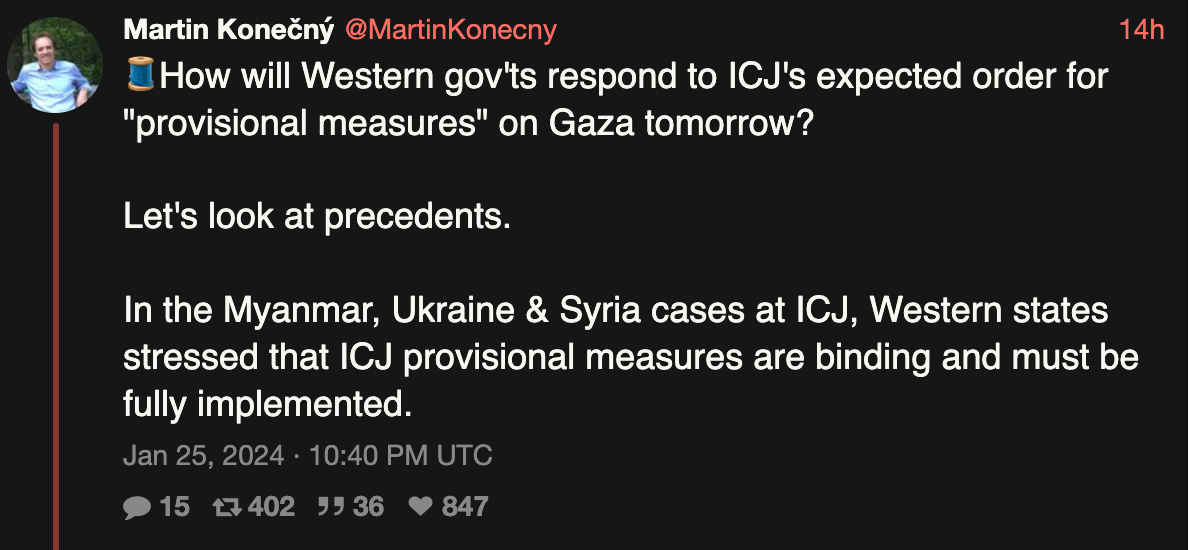
This was a Nitter thread for Martin Konecny, who heads the European Middle East Project, an NGO in Brussels specialising in European / international policies on the Israeli-Palestinian conflict. Nitter died within the last few days, unhelpfully. His thread is on X.com, but less accessible unless you’re still an account haver on Elon’s hell site.
What other governments — particularly western ones that have been Israel’s cheerleaders and munition suppliers — have reacted to the ICJ decision gives Israel its clearest signals of how seriously to take it. Konecny points out, In the cases of ICJ rulings on Myanmar, Ukraine and Syria the world saw Western states stress that ICJ provisional measures are binding, and must be fully implemented. So what about this time?
“However the ICJ case eventually resolves, the rules and institutions comprising the international rules-based order are today being undermined by the very countries that created the system.”
Renad Mansour
“There are two points to observe,” writes Richard Falk, a scholar in International law…
- “the contrast between the US impassioned allegations of violations by its adversaries, China and Russia, and its unconditional support for accused international friends and allies is a stunning display of irresponsible statecraft;”
- “the moral hypocrisy associated with such brazen double standards, severely undermines the authority of international law by treating equals unequally, and opportunistically.”
Even ahead of the court’s ruling on Israel’s attack on Gaza, The UK had been trying to block the entire hearing. Failing to stop the hearing, the British government issued a statement rejecting the ICJ’s ruling and playing down the ICJ’s jurisdiction it has previously upheld with regards to Ukraine and elsewhere.
Germany, which prides itself on learning the “never again” lesson takes strong action — internally — to stamp out a far-right and fascist resurgence. Germany took a strong stance about the Myanmar military junta’s genocidal war on the Rohingya and in genocide proceedings against Russia over its actions in Ukraine. However, in the ICJ hearings regarding Gaza, Germany sought to intervene as a third party on Israel’s behalf. A Jewish Currents editorial once summed up Germany’s double standards approach as such: “Germany is acclaimed for its efforts to atone for the Holocaust. But its method of repudiating the past has become a tool of exclusion.”
Namibia — which like Germany has also upheld ICJ rulings in Myanmar and Ukraine — turned on its former colonial ruler, and asked it to “reconsider its untimely decision to intervene as a third-party in defence” The significance in Namibia’s history with Germany cannot be over-stated with regards to calling our Germany’s blatant hypocritical perspective. To quote the BBC article, “German colonisers massacred more than 70,000 Herero and Nama people between 1904 and 1908. Historians consider this to be the 20th Century’s first genocide.” Namibian President Hage Geingob noted in his rebuke of Germany that, while it recognises its guilt about genocide in Europe, it had “yet to fully atone for the genocide it committed on Namibian soil.”
France has also joined Germany, but with that very French need to take things even further. The Macron government’s argument, that “to accuse the Jewish state of genocide is to cross a moral threshold” is essentially an argument to exclude a state from being subjected to international law on the grounds of historical crimes against a people (before the state existed, and in Europe). It’s worth noting that France’s former colonial subject Algeria has called the next Security Council meeting — as the current representative of the “Arab Group” on the council — to push it to call for a total ceasefire in Gaza as the only real way through which the ICJ’s orders can be met.
The United States, which could be heavily implicated in war crimes as a result of the ruling, released a bizarre statement which both rejects it and seems to not have taken on board what the substance of the findings, or how the ICJ functions. The Biden Administration’s immediate response was to say the ruling will not change U.S. policy in support of the Gaza siege at all. As a result, a civil case was filed in a California federal court accusing the Biden administration of complicity in genocide. It won’t be the last. Aside: While now downplaying the ICJ’s authority, the White House is choosing to be keenly supportive of international norms around maritime law.
Almost immediately following the ICJ ruling an almost unanimous swath of Western governments froze all funding to the UN’s Relief and Works Agency for Palestine, UNRWA. The freeze was announced in response to an investigation that some staff may have been part of Hamas’ October 7 attack on Israel, but that investigation is not new and named staff facing the allegations have been sacked and do face criminal charges. The impact on the ground is a massive cut in food and other necessities for survival. It is hard to not see this as collective punishment and an example of a double standard. It is what Trump would do.
Belgium announced it supports the ICJ. Nice.
The double standards exhibited by Western states that are willing to throw international law under the bus when it’s convenient isn’t lost on the rest of the world.
The lack of consistency, the double standards and overt hypocrisy are increasingly more noticeable. “The head of the European Commission, Ursula von der Leyen, has condemned Russian attacks against civilian infrastructure in Ukraine, almost in the same breath as expressing steadfast support for Israel as it destroys the last working power plants in Gaza and renders the Strip almost uninhabitable,” writes Janina Dill, in Time Magazine. “Uncritical support for Israel fuels the charge, widespread in the Global South, that the West invokes international law only to constrain ‘the rest.’”
“Western governments will come under greater public and political pressure to reconsider their unqualified support, and material support in particular, for Israel’s onslaught on the Gaza Strip. It also raises the possibility of legal exposure and individual criminal responsibility,” said Mouin Rabbani, a political analyst. “That said, I do not expect them to change their policies in any substantial way. Western governments have always treated international law as something that only applies to others, and this case will be no different.”
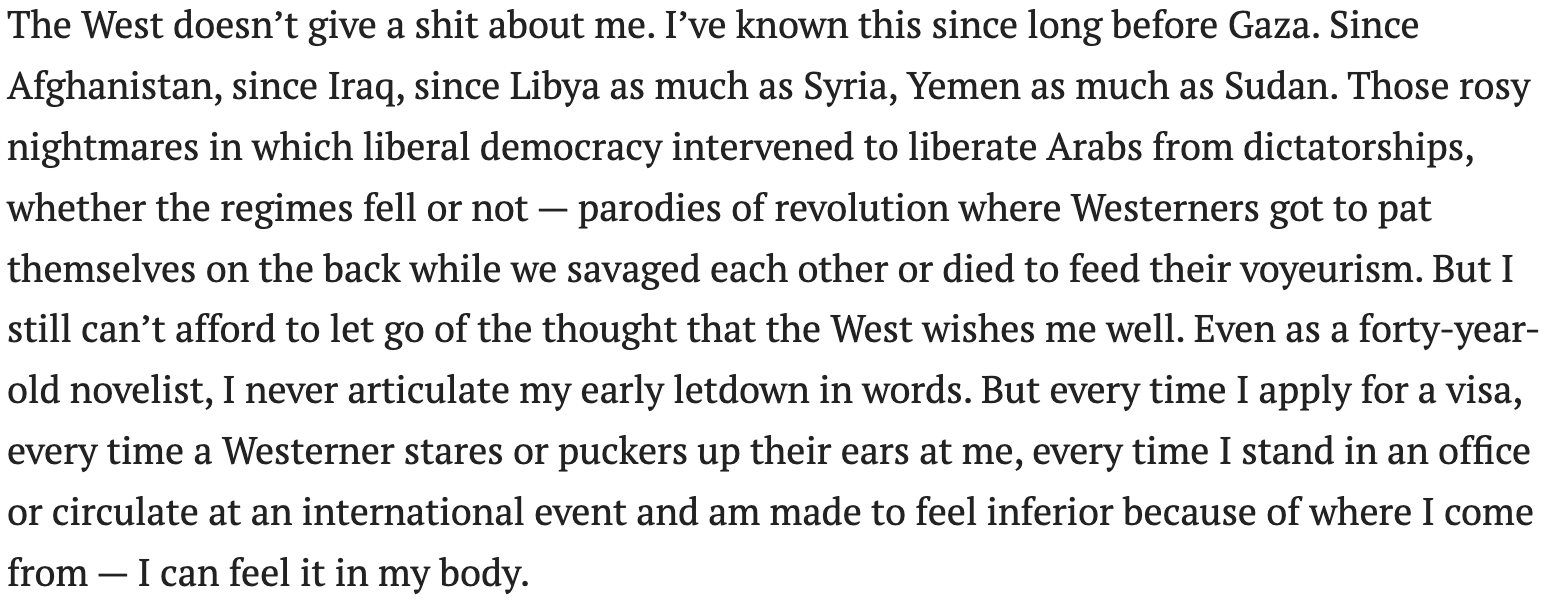
In +972 Magazine, Amjad Iraqi wrote that “In justifying the violent unravelling of Gaza as ‘self-defence,’ Western capitals have once again signed off on Israelis’ license to act like despots. … What it really wants is for the world to indulge Israel’s right to tyranny: to violently redesign its geopolitical environment, to secure its military and demographic dominance, and to do whatever it wishes to the Palestinians without criticism or consequence.” From President Biden, Israel got that. “Joe Biden is actively abetting Israel’s unbridled assault on Gaza, rejecting the very notion of a ceasefire and even bypassing Congress to deliver more weapons.”

Meanwhile, in Israel it’s already been pretty well publicised that the government rejects the law and the jurisdiction of the ICJ. Like clockwork, many in the Israeli establishment have declared that the ICJ is anti-Semitic. The Guardian reported: “Yoav Gallant, Israel’s defence minister – who was cited by the court president for calling Palestinians ‘human animals’ at the start of the Israeli offensive – said: ‘The international court of justice went above and beyond when it granted South Africa’s antisemitic request to discuss the claim of genocide in Gaza, and now refuses to reject the petition outright.’” Israel also excludes itself from the taboo of invoking the Holocaust to describe present day situations.
For Palestinians, the ICJ ruling is a huge step forward in recognition of their lived experience not just now, but as something that’s been ongoing for a century more or less. “This was a watershed moment and a landmark decision,” Omar Shakir, the Israel and Palestine director at Human Rights Watch, told The Nation. “It puts Israel and its allies on notice that immediate action is needed to prevent genocide and further atrocities against Palestinians in Gaza.”
In a Democracy Now interview, Palestinian human rights attorney Diana Buttu described this judgement by the ICJ as “an amazing ruling, because it highlights everything that the South African team and, of course, Palestinians have been saying the entire time, which is that Israel is plausibly carrying out genocide. And so, the fact that the court has indicated to Israel that they have to take measures to prevent genocide, to make sure that soldiers are doing the same, to prosecute those individuals who are inciting, including high government officials, and ensure that there is effective humanitarian aid, is precisely what was sought by Palestinians. It’s now up to the world to make sure that this court ruling is actually enacted.”
It’s worth noting at this stage the asymmetry. Israel is a state, and the territories that constitute a Palestine are not. This is not just semantics, it’s a legal definition and puts Palestinians — in many contexts — in legal limbo. Palestinians lack the representation, rights and protections that anyone who’s a citizen of a state, even many shitty ones, can have. In n+1 magazine, Jake Romm and, Dylan Saba write that “decades of Israeli state policy has had as its principal objective the prevention of a sovereign Palestinian state and Palestinian entrance into the community of nations. With the help of the United States, Israel has largely succeeded — Palestine is not a member state of the United Nations and does not have standing to petition many international bodies.”
Palestinians have for decades been living in that extra-legal status, with some striking similarities to what Timothy Snyder (remember him?) discussed. Yes, we are drawing a comparison to how Snyder described what’s possible when a population is targeted and deprived of citizenship and those associated rights. No, this is not to say that the situation of Palestinians is a carbon copy of the Jews in Nazi-era Germany. They are not identical. It’s okay. Breathe.
“Without the establishment of an independent Palestinian state with East Jerusalem as its capital on the borders of 1967, there will be no security and stability in the region,” said Nabil Abu Rdeineh, spokesperson for Palestinian president Mahmoud Abbas. That has never been part of any Israeli’s government’s serious ambitions, though, and Israel has never officially accepted its internationally recognised borders. Netanyahu recently took the opportunity to reiterate his Likud party’s long held view: total opposition to Palestinian statehood. In terms of having a rights-based framework that respects Palestinians equally, history has shown that the PA’s spokesman’s expressed view is the only way to achieve it: Without a state, Palestinians remain in ghettos, and many are part of a diaspora without a strong foundation for rights or recourse.
Of course, with statehood also must come responsibility. Arguably if there was a Palestinian state and the October 7 attack had happened, there could be an ICJ charge against its government in this alternative reality. Alas, we are in this timeline. Lisandra Novo, a former judicial fellow for the ICJ, writes for the Atlantic Council, “…it is worth noting that the ICJ only has jurisdiction over states, not over acts committed by Hamas and other Palestinian groups.” James Smith writes in The Atlantic that this creates “a loophole” though one arguably not doing Palestinians much good. “Hamas cannot be called before the International Court of Justice, nor can any government of Gaza, nor even Palestine, which is not a fully sovereign state and has only observer status at the United Nations.” This doesn’t mean that Hamas members guilty of crimes can’t be held to account through legal means, such as at the International Criminal Court, but Israeli military actions has all but buried progress on that option under the rubble of what’s taken place since.
The double standards and selective disregard for rules-based international order isn’t lost on the kids. Ezra Klein notes in the NYTimes that while a two-state solution “is dismally unpopular in Israel,” there’s a demographic shift under way in the U.S. If Biden isn’t paying attention to what Netanyahu is saying, a generation now feeding the rolls of registered U.S. voters seems to be. In a recent Times/Siena poll Klein cites, respondents in the Generation Z demographic were 27% more likely sympathise with Israel’s case while 46% had a position favourable to Palestinians. 55% were opposed to additional Israel aid. When asked whether “Israel is seriously interested in peace,” 59% said no. Even in Biden’s own White House staff, there is disagreement, dissent and resignations over his one-sided approach.
It’s a ticking clock. Biden’s “blue dog” Democrats are dying off. John Fetterman’s frenzied waving of an Israeli flag from a roof while protesters below call for a ceasefire doesn’t help. Nancy Pelosi accusing pro-Palestine demonstrators of having links to Russia and demanding the FBI to investigate them doesn’t help. Biden-or-bust Democrats scolding anyone who dares criticise White House policy on this doesn’t help. Most of all, Biden’s own stance doesn’t help.
”Having covered both Russia and Israel for years, having written very directly about the malignity of Putin’s government and the horrors of his wars on Ukraine and Georgia as well as this blood-drenched onslaught on Gaza, I find this [claim] from Pelosi nauseating.”
Megan Stack, journalist.
This shift could mean more immediate problems, particularly for the Democrat’s slim grip on the White House this year. Nearly four years after he was booted from office, the U.S. remains stuck in the Trump era. It’s possible that the Biden White House will become little more than an intermission. Polling suggests this current trajectory is not popular with a number of voters who won’t vote conservative but will swing between voting for third parties or just sitting it out. I’m not going to hazard a guess on it. If he does get back in the Oval Office, things won’t have shifted on much on the big-ticket items from where he left them.
The cohort of Western governments opposing the ICJ ruling shares something in common with the MAGA horde storming the U.S. Capitol in January of 2021. Remember them? They too didn’t like some results, and they had a temper tantrum about it. Had it gone the other way, these people would have been out in the streets celebrating the system they wanted to tear down. Last I checked every world leader who wants to throw the ICJ under the bus is running a country that is a subject to it.
This comfort in opting out has a number of other dangerous angles. In November last year, Texas’ Republican Governor Greg Abbott went to Israel to make the legally dubious vow that his state of would offer its “complete and total support.” Since then, Abbott has declared that he can ignore a Supreme Court ruling against the barbed wire he’s laced along Texas’ border with Mexico. Abbott is now in a standoff with the Federal Government over it with the support from 25 other Republican governors. Many are the same ones who cheered Trumps appointments to the Supreme Court and celebrated the ruling to overturn Roe Vs. Wade. But the conservative dominated SCOTUS is now the enemy, too. It may not have reached Civil War levels, but as Trump applauded Israel’s staunch ally in Texas for defying the U.S. government, it’s a situation that presently has no clear de-escalatory route for Biden, except his current one, which is to sound more like Trump.
Trump was fundamentally at odds with the idea of a rules-based international order. It’s been happening for a while, but he really gave it a turbo charge after he took office in 2016. He took the U.S. out of Paris Climate Agreement, the Trans-Pacific Partnership, UNESCO, the Iran nuclear deal, and the UN Human Rights Council. It makes sense that he’d be pals with UK carpet bagger Nigel Farage, whose only political drive was to get the United Kingdom out of the EU, and other kinds of legal mechanisms like the European Convention on Human Rights. For people like Putin, Modi, Netanyahu, Trump, Orban and others we could list here, it makes sense to bend, change or ditch the rules: Might makes right. Or as Snyder describes it, it leads to “fighting it out on the streets.”
But the current Western opposition to the ICJ ruling puts them well within the same trajectory. The ICJ’s rulings described by Western governments as binding for their adversaries alone. Russia and Myanmar, sure. But not Israel. “The Israel–Palestine conflict is exposing the inherent contradictions in the West’s stance as the guarantor of the international order,” writes Renad Mansour, a senior research fellow at Chatham House. “The intention was to prevent conflict and ensure that the horrors of the Holocaust in Europe or anything like it would never happen again.” In the same piece he notes: “However the ICJ case eventually resolves, the rules and institutions comprising the rules-based international order are today being undermined by the very countries that created the system.”

No one rules if no one obeys. Some may even opt to “fight it out on the streets,” to invoke Snyder once more. Often on the losing side of that manoeuvring are people who are most at risk, meaning those in legal limbo: the stateless, the migrants, refugees, exiles and asylum seekers, etc.
If the world is going to hold Putin and Russia to account for its illegal invasion of Ukraine and annexing parts of the country (and it should); and Myanmar’s military junta for its violence against the Rohingya people (and it should); and China’s government over its abuses against the Uyghur population (and it should); and the Assad regime for multiple war crimes (and it should), and Iranian regime for its repression inside the country as well as its efforts to sow discord in the region (and it should); and the Houthis for war crimes, acts of slavery, blocking water supplies to towns in opposition areas (and it should); and Hamas for war crimes, notably acts on October 7 (and it should); and anything else I’ve left out of this epic run-on sentence that may apply… (phew) then more it needs to join what we could dub “The Axis of Moral and Ethical Consistency in the Application International Law.”
This would mean The West must drink the Kool-Aid itself. It needs to apply these standards inwardly, and to its more problematic allies: This includes Israel, but you could also knock UAE, Saudi Arabia, Turkey and several others into the mix. Otherwise, there is no credibility in this idea of a rules-based international order. Why wouldn’t Putin do what he wants or why wouldn’t Houthi militias lob rockets at passing ships? No one rules if no one obeys, and when the rules are selectively applied, they aren’t really rules. In an equitable system of rules-based international order there can be no opt outs, hall passes or ‘get out of jail for free’ cards. There can’t be special people, excluded people, or chosen people.

There’s a term for this in the world of tech. It’s called “eating your own dog food.” (See what I’m doing? I’m doing the thing! I’m tying it back to the weird post title. Sly. Ready for it?) Dogfooding is literally what is sounds like. It’s when you eat what you serve. In software development it represents a crucial testing practice. Development teams immerse themselves in their own product and become the end users. Similarly, in the realm of Information Security, dogfooding occurs when trainers, for example, embrace the same practices and tools that they aim to get their students to adopt. We could all use a little more of this in the world. Yeah, a person could just say “practice what you preach,” but where’s the clever allusion in that?
There’s no shortage of dog food to go around. Yes, Western governments are undermining the ICJ (except for Belgium! We see you for your beer, waffles, chocolates, Smurfs, and moral courage!). And Israel has currently dismissed the ruling. We’ve discussed all of those. The findings of the court have had many vocal supporters around the world and in Western countries as well, the vast majority of them simply relieved to see some justice delivered and possibly a pathway out of the current horror show of endless death, destruction and misery in Gaza. However, here too, there are those who show a carefully curated acceptance of facts and history, and the systems that underpin what The Hague itself represents.
Yes, we’re going to close the post with some punches to the left. Or the faux-left, anyhow. The campists, or the tankies, or whatever is the fashion to describe these people nowadays. Every once in a while, I see someone demand the ICJ ruling be upheld while referring to Israel as “Israel” (note quote marks) as if it wasn’t a state. We know it’s a state — for many reasons that should be obvious — but one is because that’s how the ICJ can have a hearing about what it does.
Others are selective with the narration of events, accepting news about the devastation in Gaza, but also buying into a conspiracy theory that the Hamas attack in Southern Israel on October 7 was a false flag event, or inside job (regardless of Hamas officially taking credit for it). They are as selective about when the rules apply as those MAGA protestors, the world leaders who dismiss the ICJ ruling, and the extremely online Israel-first people.
“This pro-fascist left seems blind to any form of imperialism that is non-western in origin,” wrote the British-Syrian human rights activist Leila Al-Shami in 2018. By this point in Syria over half a million people had been killed, Assad was receiving support from Iran, Hezbollah and Russia, and had chemical weapons twice in heavily populated civilian areas. Some leftists bizarrely imagined Assad as a defiant anti-imperialist revolutionary against The West, as opposed to a dictator just clinging on to power. “Everything that happens is viewed through the prism of what it means for westerners,” Al-Shami wrote, “only white men have the power to make history.”
With Syria, I learned a lot about a number of Western leftists who had sounded ostensibly good on the issue of Palestine. Their output during the Syrian war in many ways would share a lot of things in common with Israeli propaganda aimed at discrediting pro-Palestinian efforts. This would include allegations that first aid responders were “terrorists,” denying war crimes, attacking the OPCW, and just generally shilling for Assad’s murderous regime. Syria brought out the “horseshoe alliance” that connected the West’s fringe left with the far right.
Many of these same people would do it again about Ukraine in a few years following Russia’s illegal, colonialist invasion, once again aligning themselves with many in the Western far-right who would take Putin’s view. Once more, these people positioned themselves as “anti-Zionist” with regards to Palestine, yet were fairly happy to accept Putin’s ethnocentric arguments for annexation. This pattern would happen when many on the left denied China’s persecution of Uighur people and opposed a popular uprising and supported a dictator in Venezuela.
And now, Yemen. There is a kind of “fuck around and find out” quality to the U.S.’ current predicament with the Houthi movement in the Red Sea. But there is no reason to “hand it to the Houthis.” Ansar Allah (aka: Houthis) is not your anti-imperialist rebel alliance. It is a religiously zealous and imperial aspirant group. It has re-introduced slavery in the areas of Yemen it controls, and has weaponised access to water, cutting off access to the city of Taizz, which has a population of nearly 1 million, for example. This hasn’t stopped demonstrators in protests ostensibly supporting a Gaza ceasefire from including pro-Houthi chants on the basis that the movement claims it is targeting its rockets at cargo ships in the Red Sea to punish Israel and its allies. Harry Sheeran, a contributor to the Workers’ Liberty site, took issue with pro-Houthi chants : “The group has also been accused of locking up children as young as 13 on charges of ‘homosexuality.’ Minors who share cells with adults in the capital Sana’a are systematically raped by their adult cellmates. Additionally, the group has been accused of using human shields, hostage taking and diversion of international aid. The Houthis have also introduced slavery into areas of Yemen they control. Like Hamas and Hezbollah, this is not a group we should be supporting, even ‘critically,’ under any circumstances.”
Leftists can’t do Realpolitik and should avoid it. There is a “the enemy of my enemy” theme running through this trend. It’s a bad look and doesn’t help the people they are claiming to support. Rather it alienates any chance of intersectionality. The people escaping Assad or trying to survive the Houthis witness all this. There is still an internet. What they see is that Western Left has deemed them to be disposable.
I’m focusing on Western leftists on purpose here, and this is not a discussion about the views of those who are fairly busy surviving a conflict or extreme oppression. It’s not reasonable to expect a lot of intersectional discourse from people who are in the midst of trying to survive. Yet it does happen. Following Ukrainian President Volodymyr Zelensky’s fast support for Israel’s Gaza bombardment in October, more than 300 Ukrainian scholars, activists and artists signed a public letter expressing their support with Palestinians.
There’s more to say on this, but it’s another rabbit warren to go down that may just be best avoided. There is definitely a kind of Western liberal who’s good on everything but Palestine. They will reply-guy you on social media forever until you mute or block them. But there’s also the performative leftist who’s only good on Palestine. Suffice to say: When you hear someone saying something you like, pay even closer attention. Wait to see who they’ll throw under the bus. It tells you everything about them.
It’s these people for whom slogans like “no one rules if no one obeys” are often designed. But to quote their favourite conspiracy, cue bono, who usually benefits from that in the end? Spoiler: Usually it’s someone who prefers fighting it out on the streets. We know how that usually ends, because, to repeat Masha Gessen once more: “comparison is the way we know the world.”

